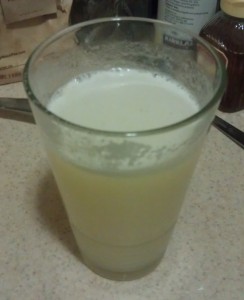Fake meats have been around for years, but a new crop of Bay Area startups backed by tech investors think they can make meat substitutes good enough to compete with the real deal. Beyond Meat — backed by Twitter founders Evan Williams and Biz Stone via their company Obvious Corp — created an eerily accurate chicken substitute, for example.
But the most ambitious project is Rob Rhinehart‘s cheekily named “Soylent,” an attempt to replace food entirely with a liquid shake that has all the protein, fat, carbohydrates and micronutrients you need. The only ingredients recognizable as food are salt and olive oil. He claims to have lived exclusively on the stuff for a month. He says he has started eating real food again, but two months later he still gets 92 percent of his meals from Soylent.
Rhinehart makes an unlikely food scientist. He’s an engineer fresh off a stint at a Y Combinator-backed networking startup called Level RF that never exited stealth mode. He says he doesn’t have a background in chemistry. “Formally no more than an undergraduate level, but I am a huge proponent of self-study, online courses, and textbooks,” he says.
He decided to create Soylent because he was tired of spending so much time and money on food. “It takes me about five minutes to portion out all the ingredients at this point,” he says. “Without water it keeps for years so I could make it far in advance to save this time.”
He’s still working out the kinks. For example, he recently posted that he had run into some trouble with sulfur deficiency. Next Rhinehart is looking to do controlled experiments with a much larger sample base. “I have spoken to no biologist that doubts the feasibility of this,” he says.
But mainstream dietitians remain skeptical. “My short answer is that I don’t know any more about this product than the limited information provided on the product website,” says Diane Stadler, PhD, RD — a registered dietitian and assistant professor of medicine at Oregon Health & Science University. Stadler warns that although we know many of the essential nutrients in food, we don’t know everything and there’s a strong possibility that an elemental diet like this could miss something critically important. “I would not promote this type of diet to the general public, as there are many ways that it can go wrong, especially if consumed long-term,” she says.
Rhinehart’s defense is that people who don’t eat well are probably already missing important nutrients. But he admits it needs more testing. He’s already selling the mix to several people, and is seeking funding. “I need funding to scale up production and conduct more controlled testing,” he says. “I have received orders of magnitude more requests than I can possibly fulfill, which is lost revenue.”
There are already many meal replacement shakes on the market, but Rhinehart plans to offer cheaper, customizable products. “An athlete would need a lot of protein, an elderly woman doesn’t need many calories, and a coder or engineer type could elect to have nootropics included, if desired,” he says. “Meal replacement products can be even more expensive than traditional food. Soylent is already much cheaper, and due to the lack of real food sources, scales very well in manufacturing.”
Given the Valley’s current penchant for food startups, I wouldn’t be surprised to see him land a round. Besides Obvious Corp, Khosla Ventures and PayPal founder and venture capitalist Peter Thiel’s Breakout Labs are also in the game.
Khosla is backing Hampton Creek Foods, which has a product called “Beyond Eggs.” It’s also backing a few other food and agricultural companies, including artificial salt company Nu-Tek Salt and fake meat company Sand Hill Foods. Last year at TechCrunch Disrupt San Francisco Khosla went so far as to say that the artificial beef, which is made from soy protein, is still “beef.” At any rate, Anthony was pretty impressed with Beyond Eggs earlier this year. Khosla also has investments in a company working on alternatives to salt and a beef substitute. Breakout Labs has invested in Modern Meadow, a company that aims to “print” lab-grown meat and leather.
All of these companies are challenging the common nutrition advice to eat whole foods and vary your diet. In fact all these projects fly in the face of current food trends that advocate whole, unprocessed foods. Both the Michael Pollan, “eat food, not too much, mostly plants” set and the Paleo set both agree that it’s best to avoid processed food and just eat what nature gave us.
But the implications could be wide for the world. I try to eat natural whole foods, but I always feel a bit uncomfortable hearing from organic food zealots and the anti-GMO crowd. Fresh organic food is expensive, and cooking meals from scratch is time consuming. And there are, y’know, starving people out there who would love to get at some highly processed, genetically modified soy.
“I think humanity has been running on the equivalent of crude oil for ages,” Rhinehart says. “Imagine creating an efficient source of fuel for every living human, alleviating global hunger and malnutrition, reducing the environmental impact of farming, performing research on poorly understood biological mechanisms and potentially bringing agricultural societies in to the global economy.”
